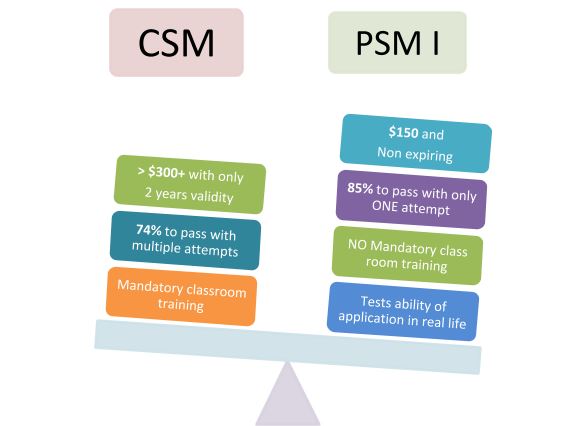PSM vs. CSM vs. PMI-ACP: How can you choose the right agile certification?
Overview
In this new era of application lifecycle management, it is essential that every organization thinking about an ‘Agile’ transformation, takes one (planned) baby step at a time towards their destination as part of their transformation journey. Given that over 90% of the IT projects tend to adopt ‘Scrum Framework’ as their primary agile practices, it is quintessential that the organization not only engages a proper consultant but at the same time, takes every effort to groom its own workforce, to be ‘Agile Ready’.
It takes a good set of Scrum Masters on the ground who can, not only help with grooming the workforce but also lay down the path for the very journey, the organization has committed to.
So if you are part of an organization which is thinking in these lines (or) if you are Scrum Master/ want-to-be Scrum master without any prior certification, then this article will help you understand and find the right certification to help you progress in your career path.

What is PSM?
Professional Scrum Master is a certification offered by Scrum.org, what many (including Ken Schwaber the co-creator of Scrum himself) call, as the organization, whose journey was shaped by two conflicting forces: the desire to make money and the desire to do the right thing.
Scrum.org was formed to refocus the efforts on doing the right thing. There are three levels of Professional Scrum Master Assessments (foundation, intermediate and advanced) that authorize and certify your knowledge of Scrum and ability to implement that knowledge.
In this article, we will focus more on PSM I, the foundation. The Scrum.org’s Professional Scrum Master I (PSM I) is a limited 60-minute evaluation, where you will have to answer 80 questions (in English) all of which are a multiple choice type, quite similar to the Scrum Open assessment.
The cost of PSM I is USD 150 and along with the purchase you receive a non-expiring password in 1 business day. A password is sent via email to all students in the PSM course after the completion of the course (usually within 3 to 5 business days).
All students in a PSM course are emailed a password upon completion of the course (typically within 3-5 business days).
Why PSM I?

If you are a budding Scrum Master or a person already playing that role but do not have a formal certification yet, PSM I is a great place to start with. The best part is that there is NO mandatory classroom training that you need attend as a pre-requisite and it judges you, not just on your theoretical knowledge but also tests if you are really capable of applying that knowledge in a real-world situation.
What else do you need? A perfect test, isn’t it? Also, you get only one attempt and you can decide, where and when to take it. So it’s really bold and puts you under real test, right from the word go. Probably one of the main highlights is that there’s no expiration date on the certification once you have acquired it.
The value of certifications like PSM is certainly not in the certification itself, but in the way, it makes you study, learn, experiment and adapt. It would obviously, encourage practitioners to use the certification as part of their practical nature of trying to be agile.
Moreover, it is important to highlight here, that Microsoft® uses the PSM I assessment to verify knowledge as part of its Silver and Gold Application Lifecycle Management (ALM) competencies.
As mentioned in the Scrum.org website,
“Unlike other Scrum certifications that require only class attendance, Scrum.org certification requires a minimum score on an online assessment. Attending a course is neither required nor sufficient for certification. This gives Scrum.org certification teeth and ensures that it has true value in the marketplace.”
What is CSM?
The Certified ScrumMaster (CSM) is a well-known Agile certification available as an entry-level certification focused at providing professionals with a knowledge of the methodologies and values of Scrum, including accountability, team performance, and iterative progress.
Unlike PSM I, where you can jump straight into the online test, CSM requires you to attend a mandatory 2 day (16 hours) session provided by Scrum Alliance (or its recognized partners).
Once you have completed this pre-requisite (classroom training), your instructor will send your information over to Scrum Alliance, post which you will get a welcome email with guidelines for logging in to your Scrum Alliance account and accessing the CSM test site.

After receiving the welcome email, the candidate has 2 attempts to pass the test within 90 days period at no extra cost as you would have paid it previously as part of the training. There is a USD 25 charge for every additional attempt after the two free attempts in 90 days.
The CSM test questions are based on the Content Outline Learning Objectives of CSM established for this course. You may also refer to the Scrum Guide, not only for the examination but also as you implement Scrum every day.
37 of the 50 multiple choice questions must be answered correctly in order to pass the test. The test has a time limit of 60 minutes. You may bookmark, skip, and go back to the questions to review later. A warning message will appear when you click “submit” if you have any unanswered questions. Upon submitting your answers, your test results will appear instantly on your screen.
Why CSM?
For anyone who has had ‘no’ experience with Scrum, the 2 days of classroom training can come as a boon. It is pretty engaging & useful, as you will be provided with quite a few insights into the day to day application of Scrum. Just make sure that you cross check if the trainer is a registered CST & read up on him/her before you register for any of their sessions. Based on the statistics, CSM is also the most widely opted certification for Scrum throughout the world for 2019, although PSM is catching up really fast.
Another important use of your CSM certificate is that you will have access to local user groups, online social networks, and additional resources that are only available to Scrum Alliance members.
You will also get a personalized profile page on the Scrum Alliance website and have access to a specially designed logo to highlight your bio & credentials. Not bad at all, eh?
How do they compare against each other? PSM vs CSM?
First and foremost, I would like to clearly establish the fact that (according to me) both PSM and CSM would be really helpful with your career transition, into Scrum Master Role. There is no doubt about this.
However, if one really wants to compare one against the other, there are a few things that I would like to highlight. As one can see, PSM I has a challenging time limit as it comes with a single attempt ONLY and has a hard pass mark, while for CSM; time limit is not very challenging as you need to answer a lesser number of questions and you get multiple attempts too.
There is also a general perception that Scrum Alliance certifications are typically better known & recognized by US-based companies, whereas in Europe, Scrum.org seems to have a much bigger presence but there is really no hard evidence to prove this.
In short, my PSM "journey" helped me to know what Scrum is actually about. It seems to be more real world - in practice but you will always find people calling out, that there is less proof of training. Probably it’s just me & my wishful thinking.

| Certification Common Factors | CSM offered by Scrum Alliance | PSM I offered by Scrum.org |
| Cost | Over $500+ (varies for different training centers) | $150 |
| Validity | 2 years ONLY. Thereafter needs to be renewed every 2 years, at a cost of $150. | Lifetime. No renewal needed. |
| Exam Questions & Duration | 50 questions and a 60 minute time limit. | 80 questions with a 60-minute time limit. |
| Pass Mark | 74% | 85% |
| Number of attempts | Multiple (first 3 are free and every additional attempt is $25) | One attempt only (although an additional free attempt is given to those who attend the PSM training, in case they fail to clear the test in their first attempt) |
| Difficulty of Assessment | Easy (almost impossible to fail) | It’s not straightforward so needs an intermediate understanding of Scrum. |
| Classroom training & course material | Mandatory course offered by CSTs. Course materials also vary significantly in both content & quality depending on the instructor. | The course is NOT Mandatory but there is an optional course offered by PST’s in case you need one. Pretty standard course material owned by PSTs and created by Ken Schwaber. |
| Number of Certifications issued till date | There is a no clear number published by Scrum Alliance but this will be way higher when compared to PSM I. | 221,837 |
What is PMI-ACP?
The PMI Agile Certified Practitioner aka PMI-ACP® is one of the fastest-growing certifications within the Project Management Institute’s certification portfolio. Unlike PSM I & CSM, PMI-ACP focuses more on agile development in an organization than about pure Scrum.
It is for someone who’s looking to expand his/her knowledge of Scrum and Agile methods and to thrive on rapid response times within Organizations that are highly agile and responsive to market dynamics. The PMI-ACP spans multiple approaches such as Kanban, extreme programming (XP), Lean, and behavior-driven development (BDD).
The exam is pretty broad in what it questions about but not highly in-depth, with any single topic and the good part is that it aims at increasing your versatility, wherever your projects may take you.
The certification exam costs around ~ $500 and comprises of 120 multiple-choice questions which you have to answer within 3 hours. The tricky part is the pass criteria for this exam are a bit of an ‘Unknown’ really!
The candidates do not get to know any scores and the exam report just shows whether they have cleared the exam or not and what is their proficiency level. There are 3 different levels, as listed below:
- Above Target — performance better than the average Aspirants
- Target — performance on par with average Aspirants
- Below Target — performance worse than the average Aspirants
Having said this, there are a few pre-requisites that you would need to consider before taking up the PMI-ACP certification. (They are as mentioned below, listed in the PMI.org website)
- 2,000 hours of general project experience working in teams. A present PMP® or PgMP® will meet this requirement but is not required to apply for the PMI-ACP.
- 1,500 hours working on agile project teams or with agile methodologies. This requirement is in addition to the 2,000 hours of general project experience.
- 21 contact hours of training in agile practices.
Key Takeaways:
- Both CSM and PSM I, are highly competitive in terms of recognition/applicability in the job market.
- Some important aspects like standardized content, lesser fee & lifelong validity have just pushed PSM I a bit ahead in the race and I hope it just makes the whole thing much more competitive and improves the overall scrum practice standards worldwide. I’m sure Ken & Jeff will agree.
- If you have completed either of the above 2 certifications and are looking to expand your knowledge outside of scrum, then yeah PMI-ACP is a good place to start.
Thanks for your patience and wish you all the very best in your Agile journey. In case you want me to write about any specific topic, please feel free to comment below and I’ll be more than happy to add them to my ‘Blog Backlog’.
Hope to see you soon, with more such interesting topics.
Now that you know, get ahead with Agile course of your choice!
